Analysing Organisational Behaviour: Tesco's Culture and Motivation
VerifiedAdded on 2023/06/18
|15
|4906
|125
Report
AI Summary
This report provides an analysis of organisational behaviour within Tesco, a leading supermarket company. It examines how organisational culture, power dynamics, and politics influence individual and team performance, referencing Charles Handy's model to classify Tesco's culture. The report further explains content and process theories of motivation, including Maslow's hierarchy of needs and Herzberg's two-factor theory, and their impact on achieving organisational goals. It also discusses the characteristics of effective and ineffective teams and explores various philosophies of organisational behaviour relevant to a business situation. The analysis aims to provide insights into how Tesco can leverage these concepts to improve employee motivation, teamwork, and overall organisational performance. Desklib is a platform where you can find similar assignments and study tools.
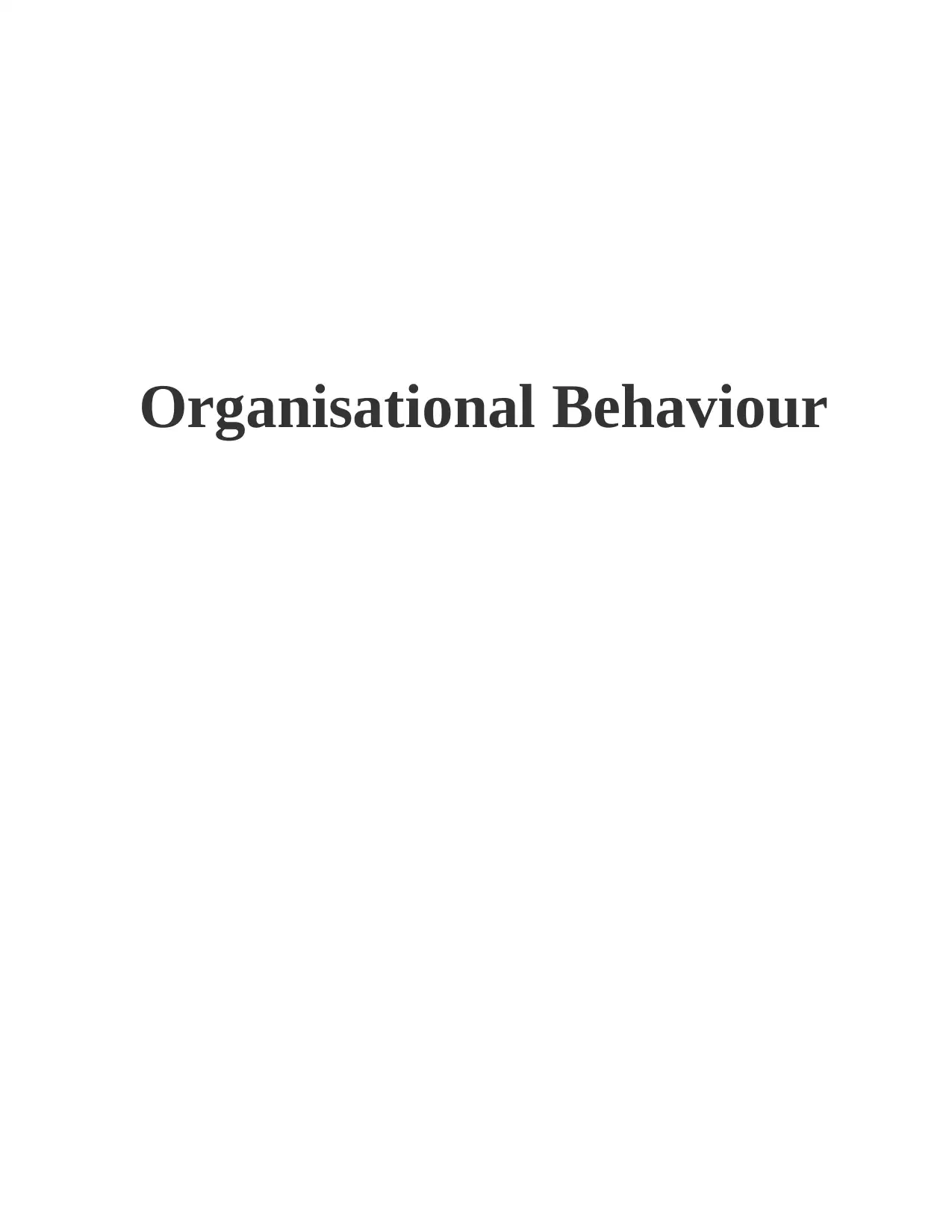
Organisational Behaviour
Paraphrase This Document
Need a fresh take? Get an instant paraphrase of this document with our AI Paraphraser
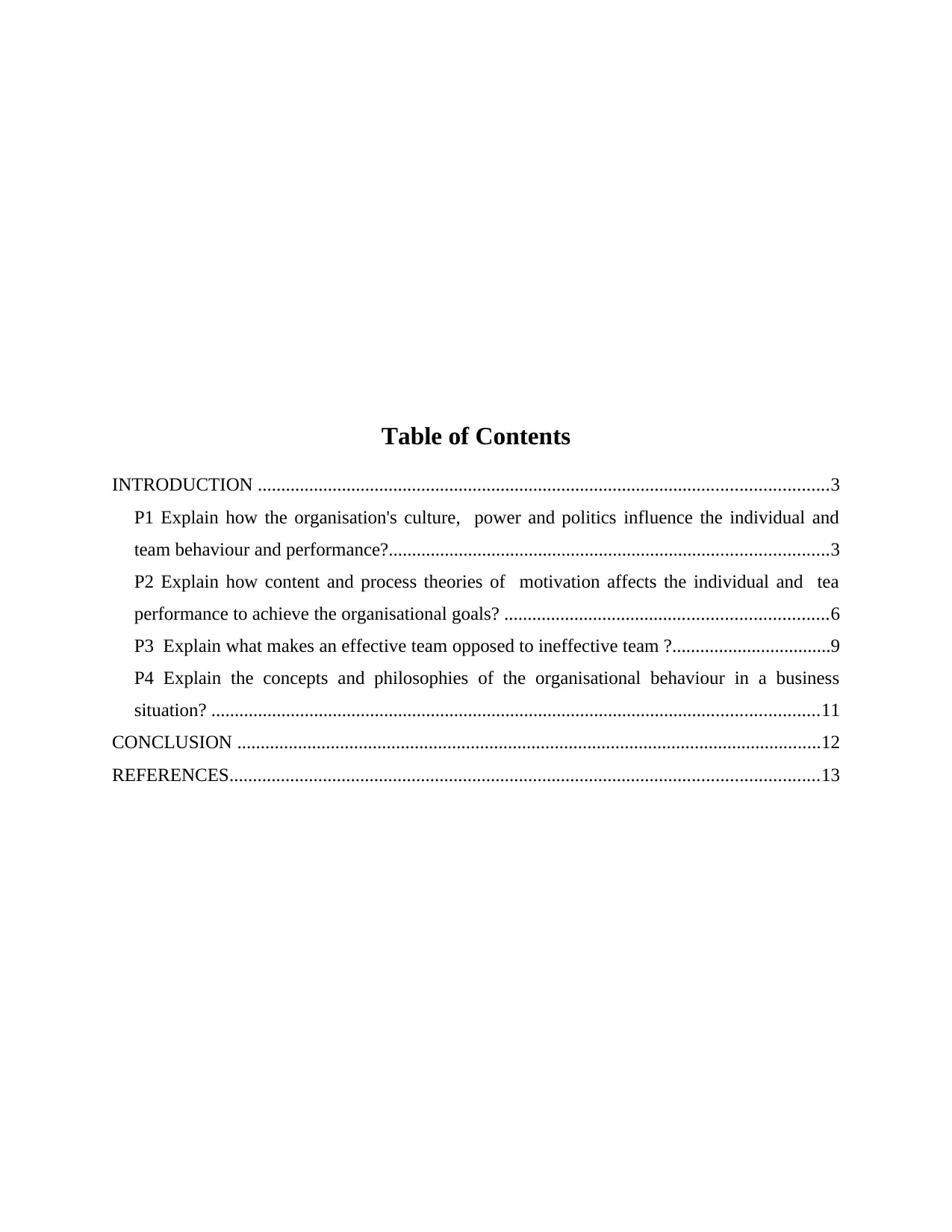
Table of Contents
INTRODUCTION ..........................................................................................................................3
P1 Explain how the organisation's culture, power and politics influence the individual and
team behaviour and performance?..............................................................................................3
P2 Explain how content and process theories of motivation affects the individual and tea
performance to achieve the organisational goals? .....................................................................6
P3 Explain what makes an effective team opposed to ineffective team ?..................................9
P4 Explain the concepts and philosophies of the organisational behaviour in a business
situation? ..................................................................................................................................11
CONCLUSION .............................................................................................................................12
REFERENCES..............................................................................................................................13
INTRODUCTION ..........................................................................................................................3
P1 Explain how the organisation's culture, power and politics influence the individual and
team behaviour and performance?..............................................................................................3
P2 Explain how content and process theories of motivation affects the individual and tea
performance to achieve the organisational goals? .....................................................................6
P3 Explain what makes an effective team opposed to ineffective team ?..................................9
P4 Explain the concepts and philosophies of the organisational behaviour in a business
situation? ..................................................................................................................................11
CONCLUSION .............................................................................................................................12
REFERENCES..............................................................................................................................13
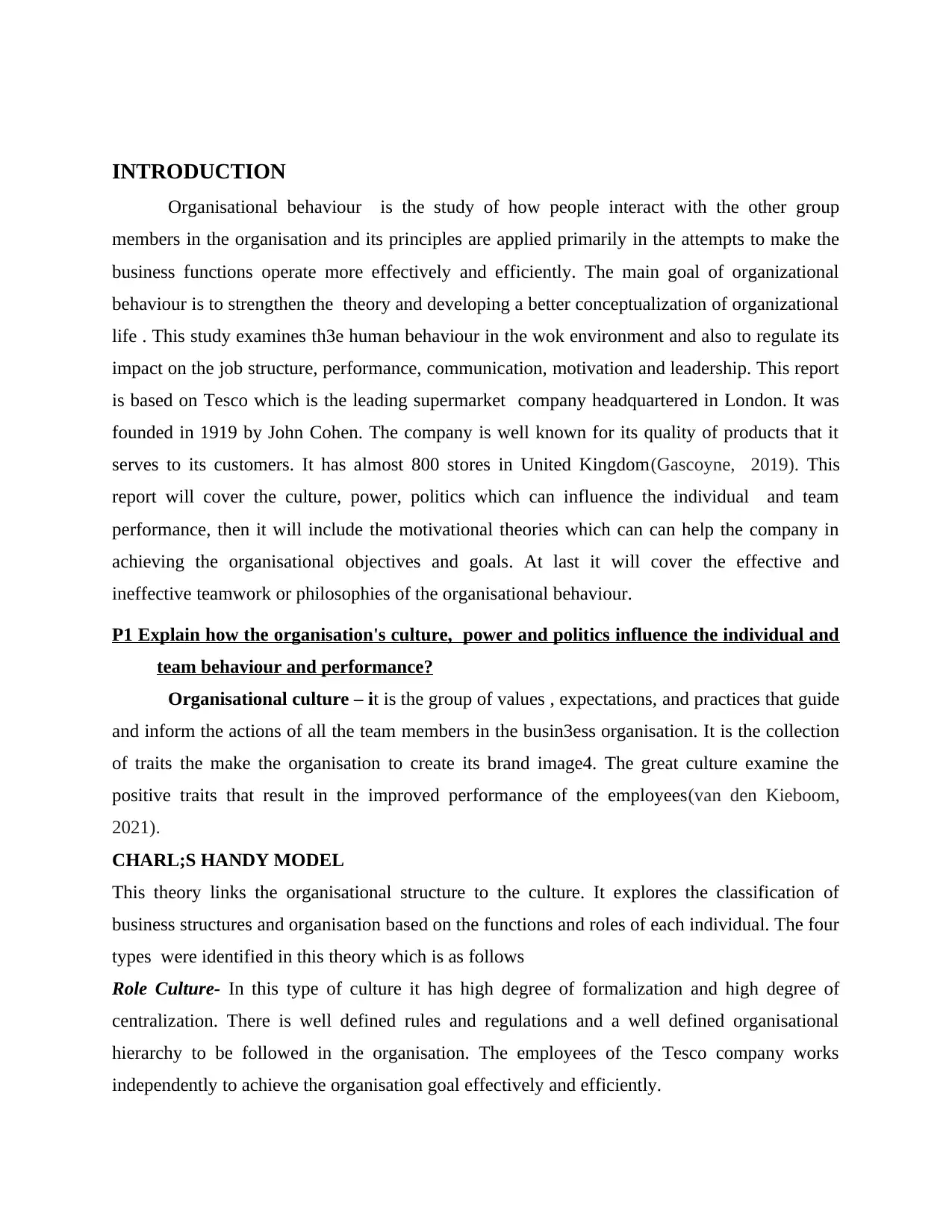
INTRODUCTION
Organisational behaviour is the study of how people interact with the other group
members in the organisation and its principles are applied primarily in the attempts to make the
business functions operate more effectively and efficiently. The main goal of organizational
behaviour is to strengthen the theory and developing a better conceptualization of organizational
life . This study examines th3e human behaviour in the wok environment and also to regulate its
impact on the job structure, performance, communication, motivation and leadership. This report
is based on Tesco which is the leading supermarket company headquartered in London. It was
founded in 1919 by John Cohen. The company is well known for its quality of products that it
serves to its customers. It has almost 800 stores in United Kingdom(Gascoyne, 2019). This
report will cover the culture, power, politics which can influence the individual and team
performance, then it will include the motivational theories which can can help the company in
achieving the organisational objectives and goals. At last it will cover the effective and
ineffective teamwork or philosophies of the organisational behaviour.
P1 Explain how the organisation's culture, power and politics influence the individual and
team behaviour and performance?
Organisational culture – it is the group of values , expectations, and practices that guide
and inform the actions of all the team members in the busin3ess organisation. It is the collection
of traits the make the organisation to create its brand image4. The great culture examine the
positive traits that result in the improved performance of the employees(van den Kieboom,
2021).
CHARL;S HANDY MODEL
This theory links the organisational structure to the culture. It explores the classification of
business structures and organisation based on the functions and roles of each individual. The four
types were identified in this theory which is as follows
Role Culture- In this type of culture it has high degree of formalization and high degree of
centralization. There is well defined rules and regulations and a well defined organisational
hierarchy to be followed in the organisation. The employees of the Tesco company works
independently to achieve the organisation goal effectively and efficiently.
Organisational behaviour is the study of how people interact with the other group
members in the organisation and its principles are applied primarily in the attempts to make the
business functions operate more effectively and efficiently. The main goal of organizational
behaviour is to strengthen the theory and developing a better conceptualization of organizational
life . This study examines th3e human behaviour in the wok environment and also to regulate its
impact on the job structure, performance, communication, motivation and leadership. This report
is based on Tesco which is the leading supermarket company headquartered in London. It was
founded in 1919 by John Cohen. The company is well known for its quality of products that it
serves to its customers. It has almost 800 stores in United Kingdom(Gascoyne, 2019). This
report will cover the culture, power, politics which can influence the individual and team
performance, then it will include the motivational theories which can can help the company in
achieving the organisational objectives and goals. At last it will cover the effective and
ineffective teamwork or philosophies of the organisational behaviour.
P1 Explain how the organisation's culture, power and politics influence the individual and
team behaviour and performance?
Organisational culture – it is the group of values , expectations, and practices that guide
and inform the actions of all the team members in the busin3ess organisation. It is the collection
of traits the make the organisation to create its brand image4. The great culture examine the
positive traits that result in the improved performance of the employees(van den Kieboom,
2021).
CHARL;S HANDY MODEL
This theory links the organisational structure to the culture. It explores the classification of
business structures and organisation based on the functions and roles of each individual. The four
types were identified in this theory which is as follows
Role Culture- In this type of culture it has high degree of formalization and high degree of
centralization. There is well defined rules and regulations and a well defined organisational
hierarchy to be followed in the organisation. The employees of the Tesco company works
independently to achieve the organisation goal effectively and efficiently.
⊘ This is a preview!⊘
Do you want full access?
Subscribe today to unlock all pages.

Trusted by 1+ million students worldwide
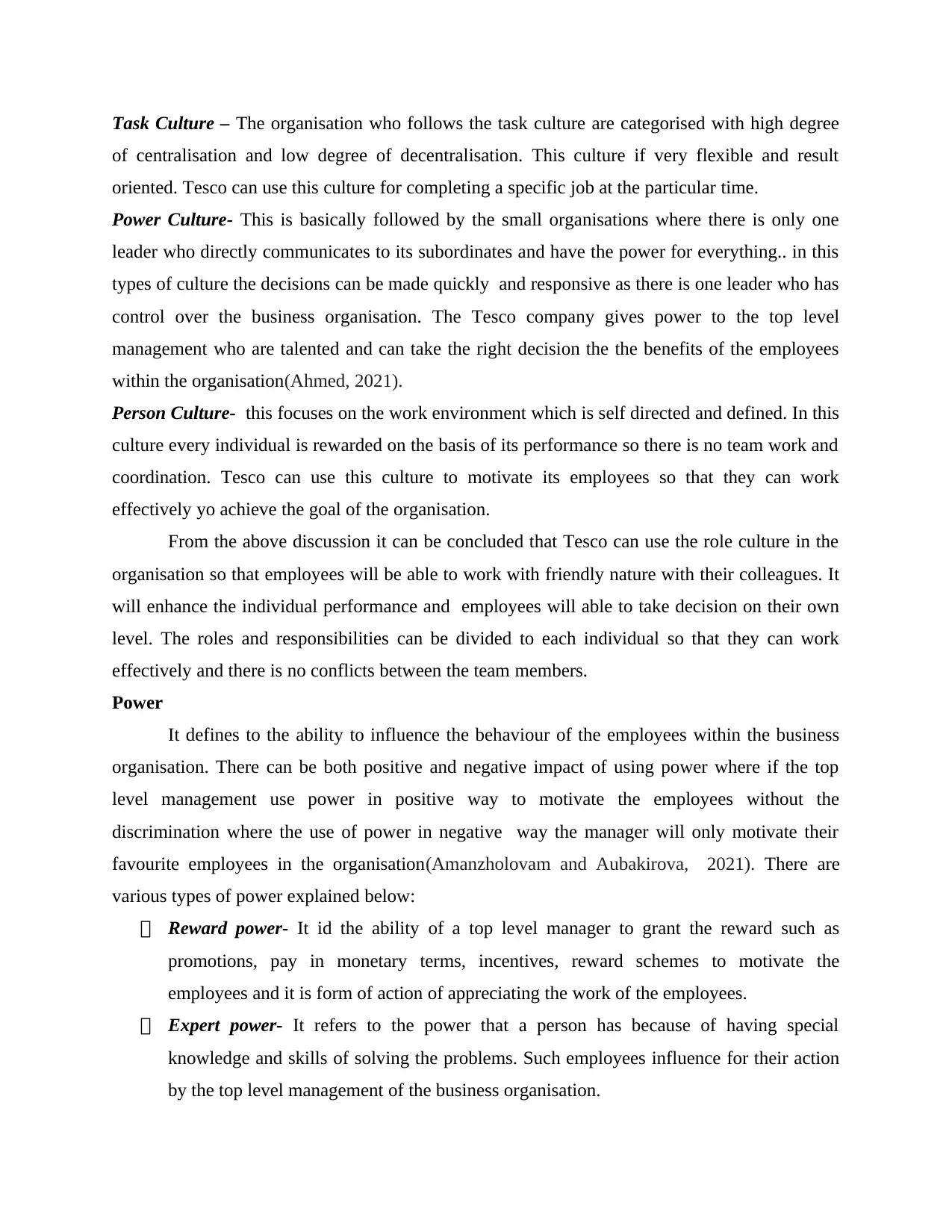
Task Culture – The organisation who follows the task culture are categorised with high degree
of centralisation and low degree of decentralisation. This culture if very flexible and result
oriented. Tesco can use this culture for completing a specific job at the particular time.
Power Culture- This is basically followed by the small organisations where there is only one
leader who directly communicates to its subordinates and have the power for everything.. in this
types of culture the decisions can be made quickly and responsive as there is one leader who has
control over the business organisation. The Tesco company gives power to the top level
management who are talented and can take the right decision the the benefits of the employees
within the organisation(Ahmed, 2021).
Person Culture- this focuses on the work environment which is self directed and defined. In this
culture every individual is rewarded on the basis of its performance so there is no team work and
coordination. Tesco can use this culture to motivate its employees so that they can work
effectively yo achieve the goal of the organisation.
From the above discussion it can be concluded that Tesco can use the role culture in the
organisation so that employees will be able to work with friendly nature with their colleagues. It
will enhance the individual performance and employees will able to take decision on their own
level. The roles and responsibilities can be divided to each individual so that they can work
effectively and there is no conflicts between the team members.
Power
It defines to the ability to influence the behaviour of the employees within the business
organisation. There can be both positive and negative impact of using power where if the top
level management use power in positive way to motivate the employees without the
discrimination where the use of power in negative way the manager will only motivate their
favourite employees in the organisation(Amanzholovam and Aubakirova, 2021). There are
various types of power explained below:
Reward power- It id the ability of a top level manager to grant the reward such as
promotions, pay in monetary terms, incentives, reward schemes to motivate the
employees and it is form of action of appreciating the work of the employees.
Expert power- It refers to the power that a person has because of having special
knowledge and skills of solving the problems. Such employees influence for their action
by the top level management of the business organisation.
of centralisation and low degree of decentralisation. This culture if very flexible and result
oriented. Tesco can use this culture for completing a specific job at the particular time.
Power Culture- This is basically followed by the small organisations where there is only one
leader who directly communicates to its subordinates and have the power for everything.. in this
types of culture the decisions can be made quickly and responsive as there is one leader who has
control over the business organisation. The Tesco company gives power to the top level
management who are talented and can take the right decision the the benefits of the employees
within the organisation(Ahmed, 2021).
Person Culture- this focuses on the work environment which is self directed and defined. In this
culture every individual is rewarded on the basis of its performance so there is no team work and
coordination. Tesco can use this culture to motivate its employees so that they can work
effectively yo achieve the goal of the organisation.
From the above discussion it can be concluded that Tesco can use the role culture in the
organisation so that employees will be able to work with friendly nature with their colleagues. It
will enhance the individual performance and employees will able to take decision on their own
level. The roles and responsibilities can be divided to each individual so that they can work
effectively and there is no conflicts between the team members.
Power
It defines to the ability to influence the behaviour of the employees within the business
organisation. There can be both positive and negative impact of using power where if the top
level management use power in positive way to motivate the employees without the
discrimination where the use of power in negative way the manager will only motivate their
favourite employees in the organisation(Amanzholovam and Aubakirova, 2021). There are
various types of power explained below:
Reward power- It id the ability of a top level manager to grant the reward such as
promotions, pay in monetary terms, incentives, reward schemes to motivate the
employees and it is form of action of appreciating the work of the employees.
Expert power- It refers to the power that a person has because of having special
knowledge and skills of solving the problems. Such employees influence for their action
by the top level management of the business organisation.
Paraphrase This Document
Need a fresh take? Get an instant paraphrase of this document with our AI Paraphraser
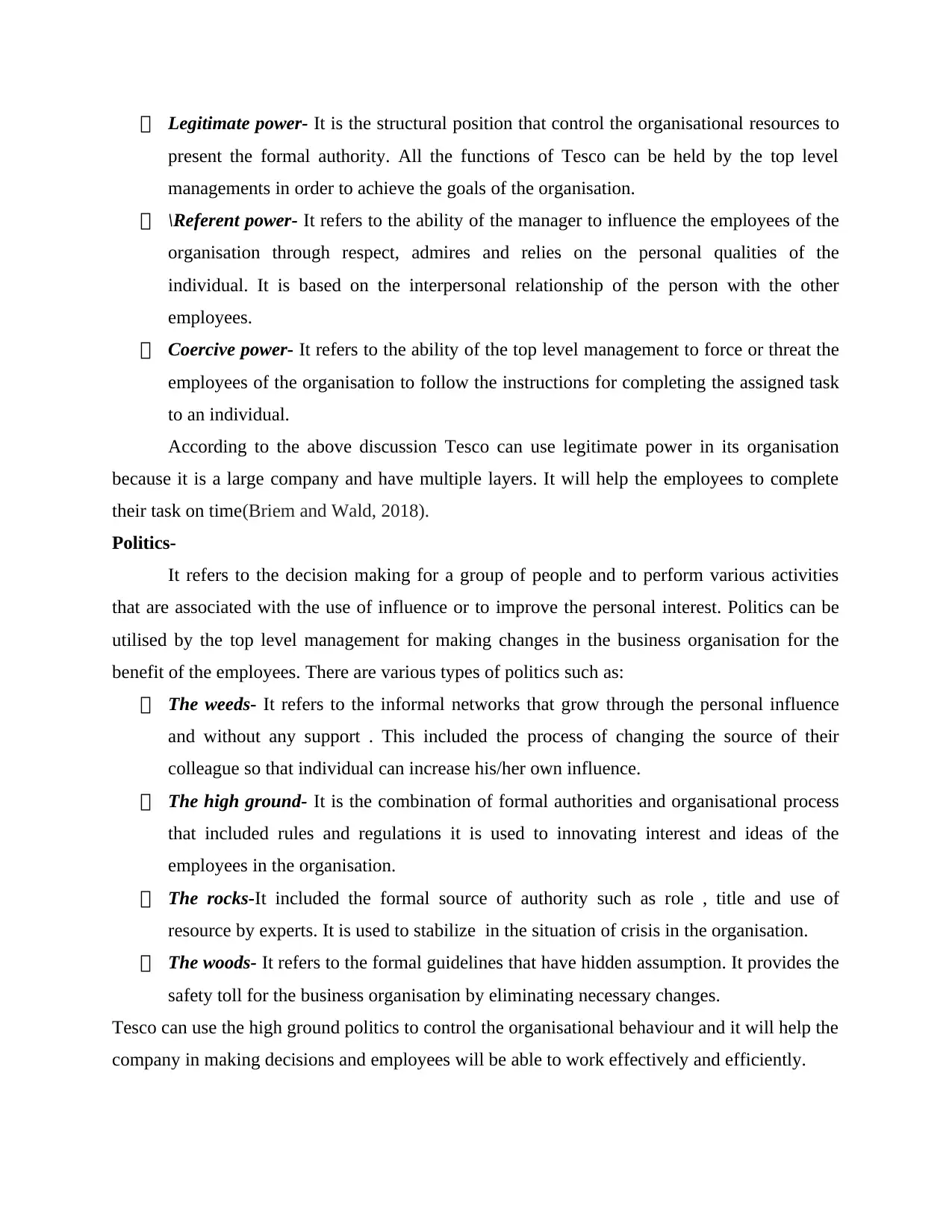
Legitimate power- It is the structural position that control the organisational resources to
present the formal authority. All the functions of Tesco can be held by the top level
managements in order to achieve the goals of the organisation.
\Referent power- It refers to the ability of the manager to influence the employees of the
organisation through respect, admires and relies on the personal qualities of the
individual. It is based on the interpersonal relationship of the person with the other
employees.
Coercive power- It refers to the ability of the top level management to force or threat the
employees of the organisation to follow the instructions for completing the assigned task
to an individual.
According to the above discussion Tesco can use legitimate power in its organisation
because it is a large company and have multiple layers. It will help the employees to complete
their task on time(Briem and Wald, 2018).
Politics-
It refers to the decision making for a group of people and to perform various activities
that are associated with the use of influence or to improve the personal interest. Politics can be
utilised by the top level management for making changes in the business organisation for the
benefit of the employees. There are various types of politics such as:
The weeds- It refers to the informal networks that grow through the personal influence
and without any support . This included the process of changing the source of their
colleague so that individual can increase his/her own influence.
The high ground- It is the combination of formal authorities and organisational process
that included rules and regulations it is used to innovating interest and ideas of the
employees in the organisation.
The rocks-It included the formal source of authority such as role , title and use of
resource by experts. It is used to stabilize in the situation of crisis in the organisation.
The woods- It refers to the formal guidelines that have hidden assumption. It provides the
safety toll for the business organisation by eliminating necessary changes.
Tesco can use the high ground politics to control the organisational behaviour and it will help the
company in making decisions and employees will be able to work effectively and efficiently.
present the formal authority. All the functions of Tesco can be held by the top level
managements in order to achieve the goals of the organisation.
\Referent power- It refers to the ability of the manager to influence the employees of the
organisation through respect, admires and relies on the personal qualities of the
individual. It is based on the interpersonal relationship of the person with the other
employees.
Coercive power- It refers to the ability of the top level management to force or threat the
employees of the organisation to follow the instructions for completing the assigned task
to an individual.
According to the above discussion Tesco can use legitimate power in its organisation
because it is a large company and have multiple layers. It will help the employees to complete
their task on time(Briem and Wald, 2018).
Politics-
It refers to the decision making for a group of people and to perform various activities
that are associated with the use of influence or to improve the personal interest. Politics can be
utilised by the top level management for making changes in the business organisation for the
benefit of the employees. There are various types of politics such as:
The weeds- It refers to the informal networks that grow through the personal influence
and without any support . This included the process of changing the source of their
colleague so that individual can increase his/her own influence.
The high ground- It is the combination of formal authorities and organisational process
that included rules and regulations it is used to innovating interest and ideas of the
employees in the organisation.
The rocks-It included the formal source of authority such as role , title and use of
resource by experts. It is used to stabilize in the situation of crisis in the organisation.
The woods- It refers to the formal guidelines that have hidden assumption. It provides the
safety toll for the business organisation by eliminating necessary changes.
Tesco can use the high ground politics to control the organisational behaviour and it will help the
company in making decisions and employees will be able to work effectively and efficiently.
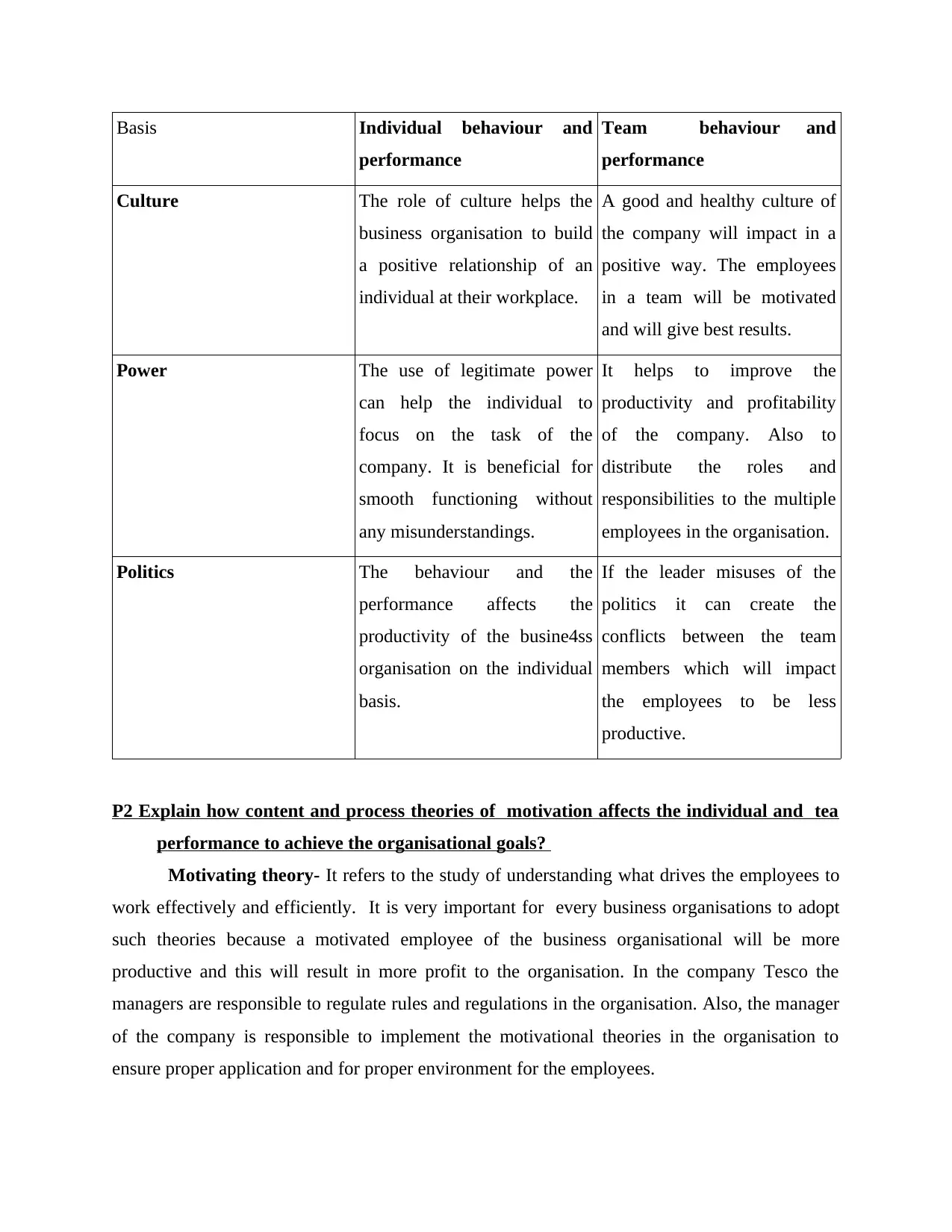
Basis Individual behaviour and
performance
Team behaviour and
performance
Culture The role of culture helps the
business organisation to build
a positive relationship of an
individual at their workplace.
A good and healthy culture of
the company will impact in a
positive way. The employees
in a team will be motivated
and will give best results.
Power The use of legitimate power
can help the individual to
focus on the task of the
company. It is beneficial for
smooth functioning without
any misunderstandings.
It helps to improve the
productivity and profitability
of the company. Also to
distribute the roles and
responsibilities to the multiple
employees in the organisation.
Politics The behaviour and the
performance affects the
productivity of the busine4ss
organisation on the individual
basis.
If the leader misuses of the
politics it can create the
conflicts between the team
members which will impact
the employees to be less
productive.
P2 Explain how content and process theories of motivation affects the individual and tea
performance to achieve the organisational goals?
Motivating theory- It refers to the study of understanding what drives the employees to
work effectively and efficiently. It is very important for every business organisations to adopt
such theories because a motivated employee of the business organisational will be more
productive and this will result in more profit to the organisation. In the company Tesco the
managers are responsible to regulate rules and regulations in the organisation. Also, the manager
of the company is responsible to implement the motivational theories in the organisation to
ensure proper application and for proper environment for the employees.
performance
Team behaviour and
performance
Culture The role of culture helps the
business organisation to build
a positive relationship of an
individual at their workplace.
A good and healthy culture of
the company will impact in a
positive way. The employees
in a team will be motivated
and will give best results.
Power The use of legitimate power
can help the individual to
focus on the task of the
company. It is beneficial for
smooth functioning without
any misunderstandings.
It helps to improve the
productivity and profitability
of the company. Also to
distribute the roles and
responsibilities to the multiple
employees in the organisation.
Politics The behaviour and the
performance affects the
productivity of the busine4ss
organisation on the individual
basis.
If the leader misuses of the
politics it can create the
conflicts between the team
members which will impact
the employees to be less
productive.
P2 Explain how content and process theories of motivation affects the individual and tea
performance to achieve the organisational goals?
Motivating theory- It refers to the study of understanding what drives the employees to
work effectively and efficiently. It is very important for every business organisations to adopt
such theories because a motivated employee of the business organisational will be more
productive and this will result in more profit to the organisation. In the company Tesco the
managers are responsible to regulate rules and regulations in the organisation. Also, the manager
of the company is responsible to implement the motivational theories in the organisation to
ensure proper application and for proper environment for the employees.
⊘ This is a preview!⊘
Do you want full access?
Subscribe today to unlock all pages.

Trusted by 1+ million students worldwide
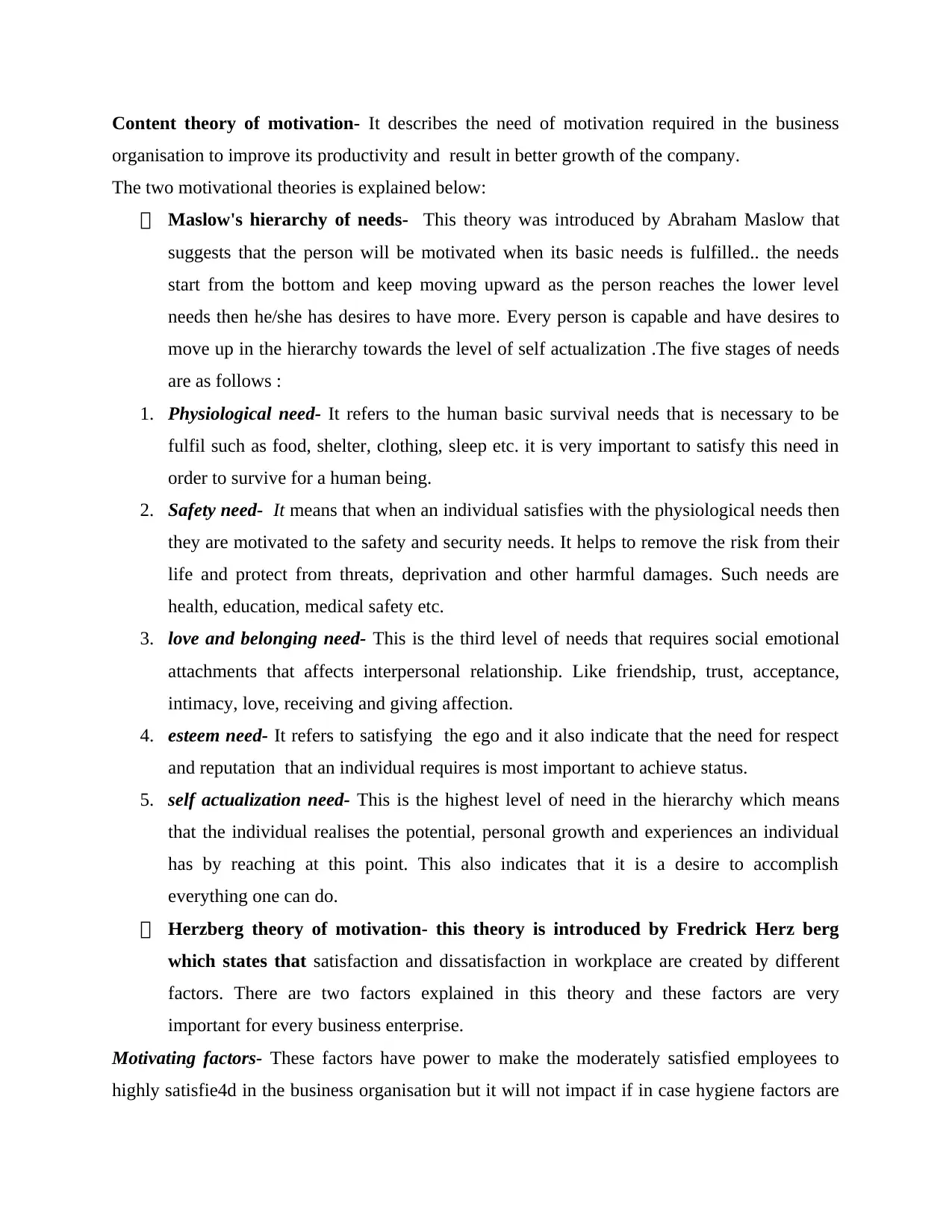
Content theory of motivation- It describes the need of motivation required in the business
organisation to improve its productivity and result in better growth of the company.
The two motivational theories is explained below:
Maslow's hierarchy of needs- This theory was introduced by Abraham Maslow that
suggests that the person will be motivated when its basic needs is fulfilled.. the needs
start from the bottom and keep moving upward as the person reaches the lower level
needs then he/she has desires to have more. Every person is capable and have desires to
move up in the hierarchy towards the level of self actualization .The five stages of needs
are as follows :
1. Physiological need- It refers to the human basic survival needs that is necessary to be
fulfil such as food, shelter, clothing, sleep etc. it is very important to satisfy this need in
order to survive for a human being.
2. Safety need- It means that when an individual satisfies with the physiological needs then
they are motivated to the safety and security needs. It helps to remove the risk from their
life and protect from threats, deprivation and other harmful damages. Such needs are
health, education, medical safety etc.
3. love and belonging need- This is the third level of needs that requires social emotional
attachments that affects interpersonal relationship. Like friendship, trust, acceptance,
intimacy, love, receiving and giving affection.
4. esteem need- It refers to satisfying the ego and it also indicate that the need for respect
and reputation that an individual requires is most important to achieve status.
5. self actualization need- This is the highest level of need in the hierarchy which means
that the individual realises the potential, personal growth and experiences an individual
has by reaching at this point. This also indicates that it is a desire to accomplish
everything one can do.
Herzberg theory of motivation- this theory is introduced by Fredrick Herz berg
which states that satisfaction and dissatisfaction in workplace are created by different
factors. There are two factors explained in this theory and these factors are very
important for every business enterprise.
Motivating factors- These factors have power to make the moderately satisfied employees to
highly satisfie4d in the business organisation but it will not impact if in case hygiene factors are
organisation to improve its productivity and result in better growth of the company.
The two motivational theories is explained below:
Maslow's hierarchy of needs- This theory was introduced by Abraham Maslow that
suggests that the person will be motivated when its basic needs is fulfilled.. the needs
start from the bottom and keep moving upward as the person reaches the lower level
needs then he/she has desires to have more. Every person is capable and have desires to
move up in the hierarchy towards the level of self actualization .The five stages of needs
are as follows :
1. Physiological need- It refers to the human basic survival needs that is necessary to be
fulfil such as food, shelter, clothing, sleep etc. it is very important to satisfy this need in
order to survive for a human being.
2. Safety need- It means that when an individual satisfies with the physiological needs then
they are motivated to the safety and security needs. It helps to remove the risk from their
life and protect from threats, deprivation and other harmful damages. Such needs are
health, education, medical safety etc.
3. love and belonging need- This is the third level of needs that requires social emotional
attachments that affects interpersonal relationship. Like friendship, trust, acceptance,
intimacy, love, receiving and giving affection.
4. esteem need- It refers to satisfying the ego and it also indicate that the need for respect
and reputation that an individual requires is most important to achieve status.
5. self actualization need- This is the highest level of need in the hierarchy which means
that the individual realises the potential, personal growth and experiences an individual
has by reaching at this point. This also indicates that it is a desire to accomplish
everything one can do.
Herzberg theory of motivation- this theory is introduced by Fredrick Herz berg
which states that satisfaction and dissatisfaction in workplace are created by different
factors. There are two factors explained in this theory and these factors are very
important for every business enterprise.
Motivating factors- These factors have power to make the moderately satisfied employees to
highly satisfie4d in the business organisation but it will not impact if in case hygiene factors are
Paraphrase This Document
Need a fresh take? Get an instant paraphrase of this document with our AI Paraphraser
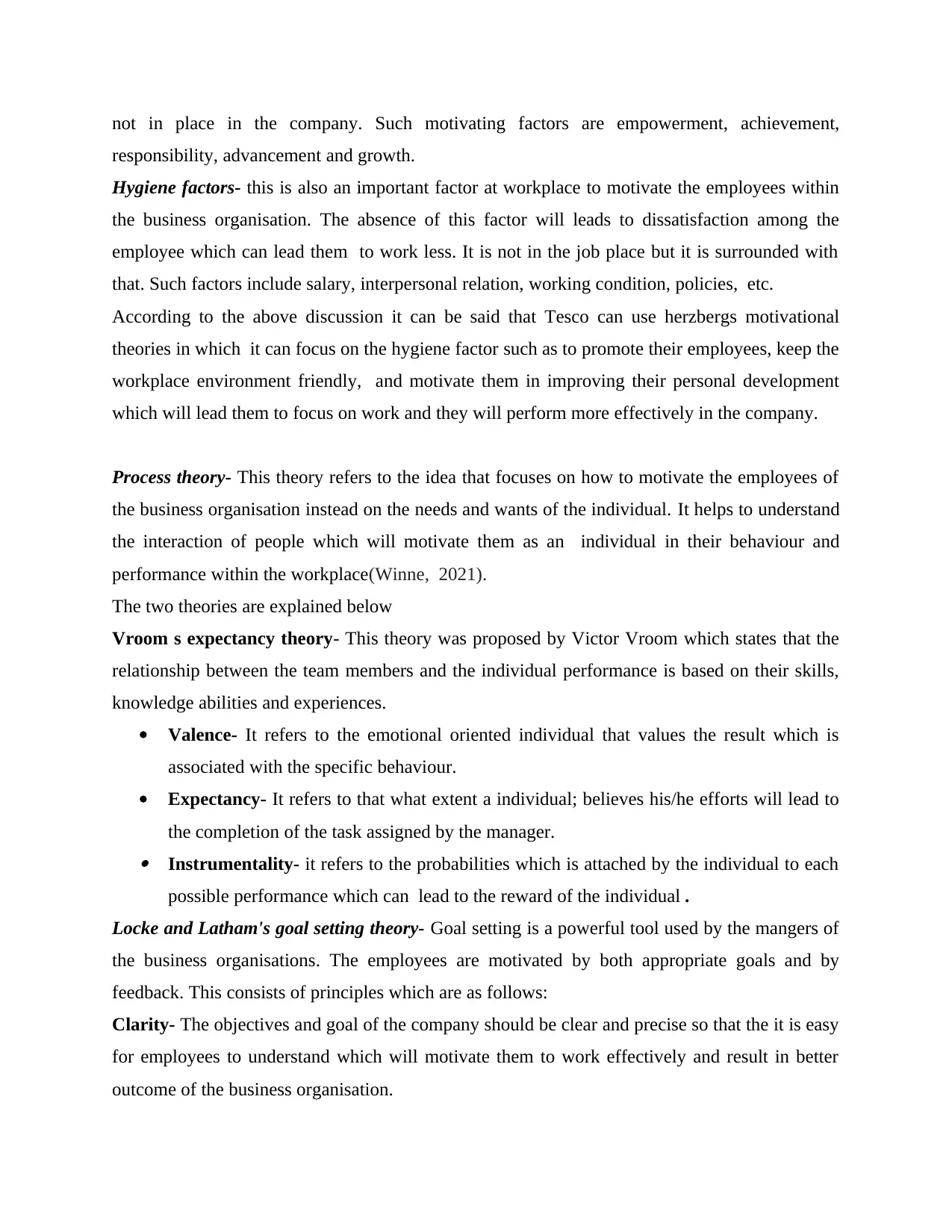
not in place in the company. Such motivating factors are empowerment, achievement,
responsibility, advancement and growth.
Hygiene factors- this is also an important factor at workplace to motivate the employees within
the business organisation. The absence of this factor will leads to dissatisfaction among the
employee which can lead them to work less. It is not in the job place but it is surrounded with
that. Such factors include salary, interpersonal relation, working condition, policies, etc.
According to the above discussion it can be said that Tesco can use herzbergs motivational
theories in which it can focus on the hygiene factor such as to promote their employees, keep the
workplace environment friendly, and motivate them in improving their personal development
which will lead them to focus on work and they will perform more effectively in the company.
Process theory- This theory refers to the idea that focuses on how to motivate the employees of
the business organisation instead on the needs and wants of the individual. It helps to understand
the interaction of people which will motivate them as an individual in their behaviour and
performance within the workplace(Winne, 2021).
The two theories are explained below
Vroom s expectancy theory- This theory was proposed by Victor Vroom which states that the
relationship between the team members and the individual performance is based on their skills,
knowledge abilities and experiences.
Valence- It refers to the emotional oriented individual that values the result which is
associated with the specific behaviour.
Expectancy- It refers to that what extent a individual; believes his/he efforts will lead to
the completion of the task assigned by the manager. Instrumentality- it refers to the probabilities which is attached by the individual to each
possible performance which can lead to the reward of the individual .
Locke and Latham's goal setting theory- Goal setting is a powerful tool used by the mangers of
the business organisations. The employees are motivated by both appropriate goals and by
feedback. This consists of principles which are as follows:
Clarity- The objectives and goal of the company should be clear and precise so that the it is easy
for employees to understand which will motivate them to work effectively and result in better
outcome of the business organisation.
responsibility, advancement and growth.
Hygiene factors- this is also an important factor at workplace to motivate the employees within
the business organisation. The absence of this factor will leads to dissatisfaction among the
employee which can lead them to work less. It is not in the job place but it is surrounded with
that. Such factors include salary, interpersonal relation, working condition, policies, etc.
According to the above discussion it can be said that Tesco can use herzbergs motivational
theories in which it can focus on the hygiene factor such as to promote their employees, keep the
workplace environment friendly, and motivate them in improving their personal development
which will lead them to focus on work and they will perform more effectively in the company.
Process theory- This theory refers to the idea that focuses on how to motivate the employees of
the business organisation instead on the needs and wants of the individual. It helps to understand
the interaction of people which will motivate them as an individual in their behaviour and
performance within the workplace(Winne, 2021).
The two theories are explained below
Vroom s expectancy theory- This theory was proposed by Victor Vroom which states that the
relationship between the team members and the individual performance is based on their skills,
knowledge abilities and experiences.
Valence- It refers to the emotional oriented individual that values the result which is
associated with the specific behaviour.
Expectancy- It refers to that what extent a individual; believes his/he efforts will lead to
the completion of the task assigned by the manager. Instrumentality- it refers to the probabilities which is attached by the individual to each
possible performance which can lead to the reward of the individual .
Locke and Latham's goal setting theory- Goal setting is a powerful tool used by the mangers of
the business organisations. The employees are motivated by both appropriate goals and by
feedback. This consists of principles which are as follows:
Clarity- The objectives and goal of the company should be clear and precise so that the it is easy
for employees to understand which will motivate them to work effectively and result in better
outcome of the business organisation.
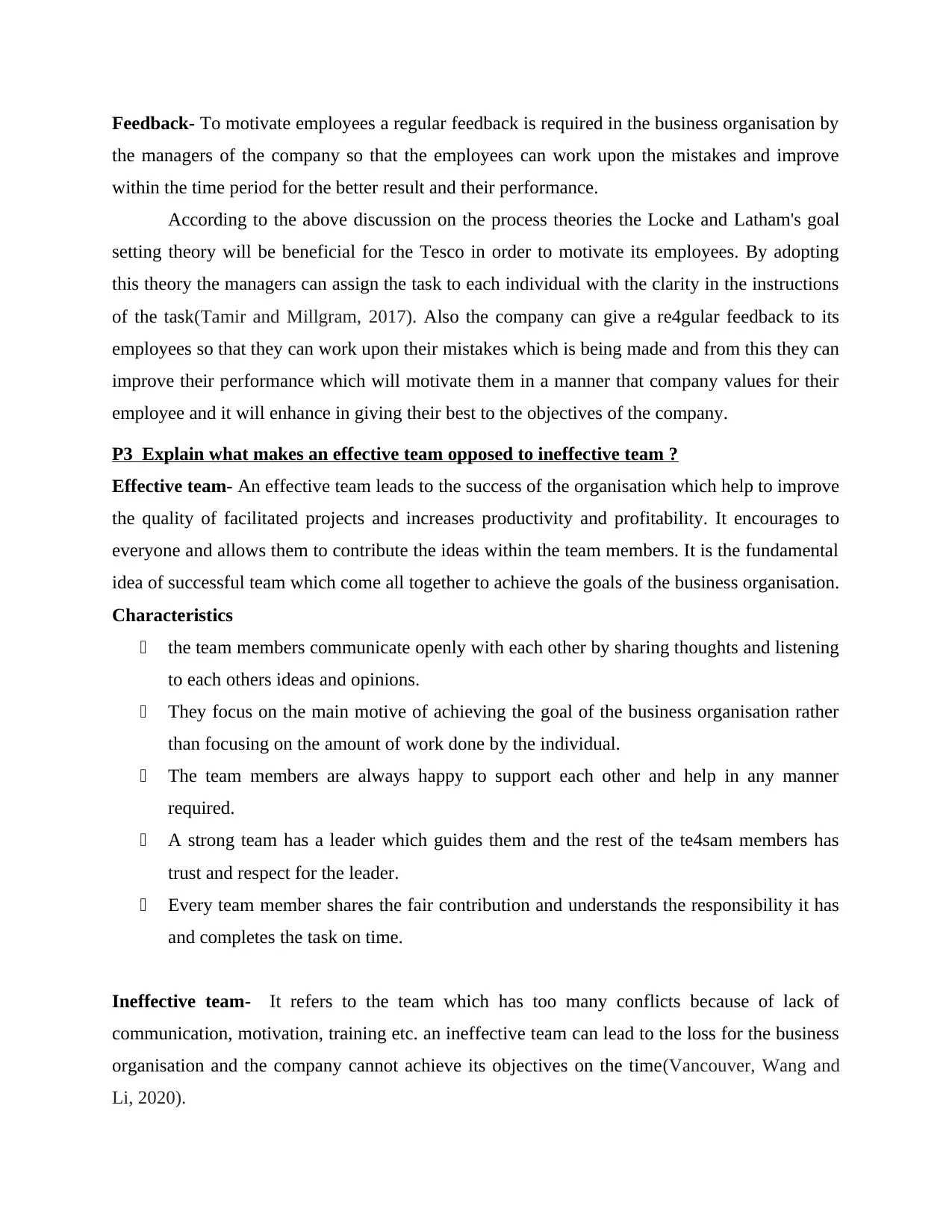
Feedback- To motivate employees a regular feedback is required in the business organisation by
the managers of the company so that the employees can work upon the mistakes and improve
within the time period for the better result and their performance.
According to the above discussion on the process theories the Locke and Latham's goal
setting theory will be beneficial for the Tesco in order to motivate its employees. By adopting
this theory the managers can assign the task to each individual with the clarity in the instructions
of the task(Tamir and Millgram, 2017). Also the company can give a re4gular feedback to its
employees so that they can work upon their mistakes which is being made and from this they can
improve their performance which will motivate them in a manner that company values for their
employee and it will enhance in giving their best to the objectives of the company.
P3 Explain what makes an effective team opposed to ineffective team ?
Effective team- An effective team leads to the success of the organisation which help to improve
the quality of facilitated projects and increases productivity and profitability. It encourages to
everyone and allows them to contribute the ideas within the team members. It is the fundamental
idea of successful team which come all together to achieve the goals of the business organisation.
Characteristics
the team members communicate openly with each other by sharing thoughts and listening
to each others ideas and opinions.
They focus on the main motive of achieving the goal of the business organisation rather
than focusing on the amount of work done by the individual.
The team members are always happy to support each other and help in any manner
required.
A strong team has a leader which guides them and the rest of the te4sam members has
trust and respect for the leader.
Every team member shares the fair contribution and understands the responsibility it has
and completes the task on time.
Ineffective team- It refers to the team which has too many conflicts because of lack of
communication, motivation, training etc. an ineffective team can lead to the loss for the business
organisation and the company cannot achieve its objectives on the time(Vancouver, Wang and
Li, 2020).
the managers of the company so that the employees can work upon the mistakes and improve
within the time period for the better result and their performance.
According to the above discussion on the process theories the Locke and Latham's goal
setting theory will be beneficial for the Tesco in order to motivate its employees. By adopting
this theory the managers can assign the task to each individual with the clarity in the instructions
of the task(Tamir and Millgram, 2017). Also the company can give a re4gular feedback to its
employees so that they can work upon their mistakes which is being made and from this they can
improve their performance which will motivate them in a manner that company values for their
employee and it will enhance in giving their best to the objectives of the company.
P3 Explain what makes an effective team opposed to ineffective team ?
Effective team- An effective team leads to the success of the organisation which help to improve
the quality of facilitated projects and increases productivity and profitability. It encourages to
everyone and allows them to contribute the ideas within the team members. It is the fundamental
idea of successful team which come all together to achieve the goals of the business organisation.
Characteristics
the team members communicate openly with each other by sharing thoughts and listening
to each others ideas and opinions.
They focus on the main motive of achieving the goal of the business organisation rather
than focusing on the amount of work done by the individual.
The team members are always happy to support each other and help in any manner
required.
A strong team has a leader which guides them and the rest of the te4sam members has
trust and respect for the leader.
Every team member shares the fair contribution and understands the responsibility it has
and completes the task on time.
Ineffective team- It refers to the team which has too many conflicts because of lack of
communication, motivation, training etc. an ineffective team can lead to the loss for the business
organisation and the company cannot achieve its objectives on the time(Vancouver, Wang and
Li, 2020).
⊘ This is a preview!⊘
Do you want full access?
Subscribe today to unlock all pages.

Trusted by 1+ million students worldwide
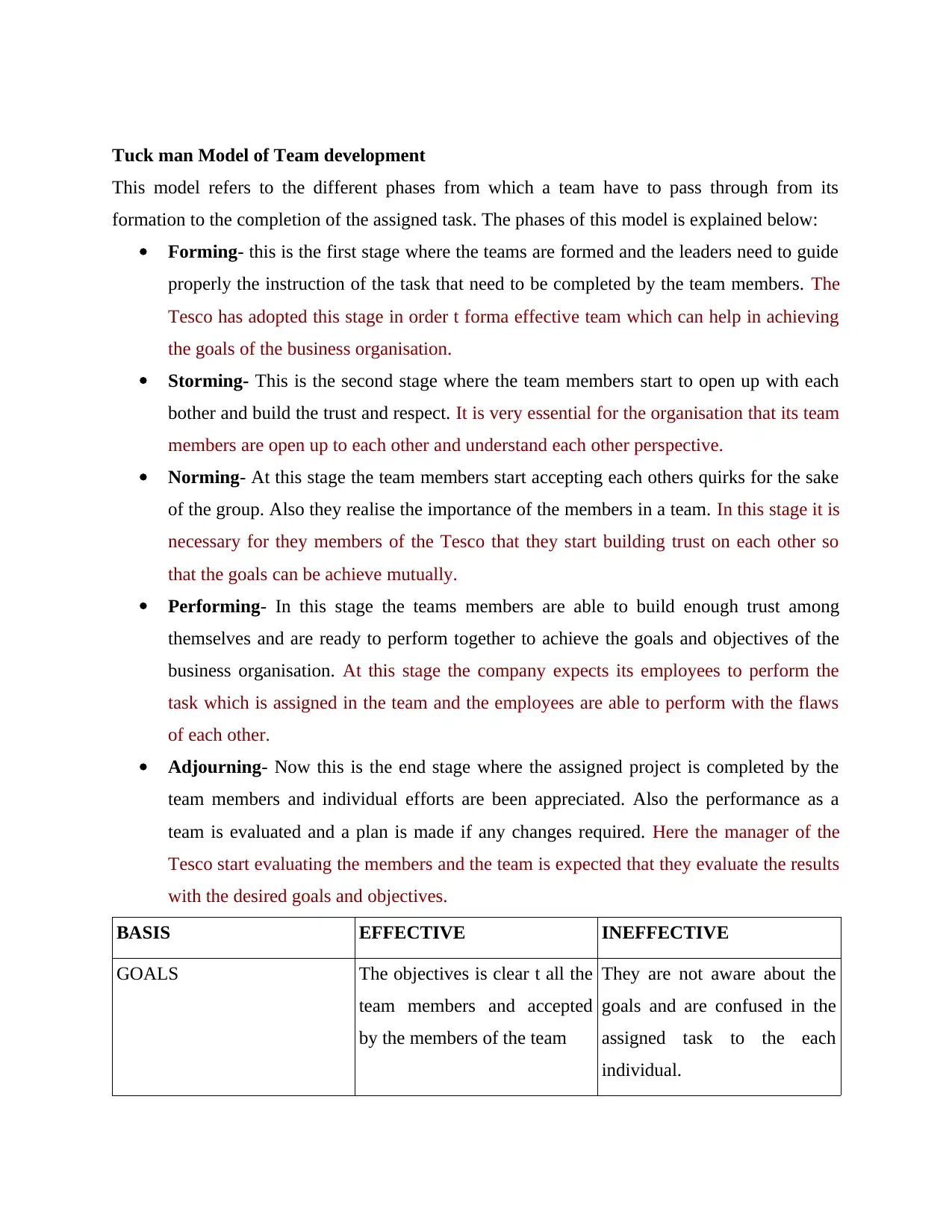
Tuck man Model of Team development
This model refers to the different phases from which a team have to pass through from its
formation to the completion of the assigned task. The phases of this model is explained below:
Forming- this is the first stage where the teams are formed and the leaders need to guide
properly the instruction of the task that need to be completed by the team members. The
Tesco has adopted this stage in order t forma effective team which can help in achieving
the goals of the business organisation.
Storming- This is the second stage where the team members start to open up with each
bother and build the trust and respect. It is very essential for the organisation that its team
members are open up to each other and understand each other perspective.
Norming- At this stage the team members start accepting each others quirks for the sake
of the group. Also they realise the importance of the members in a team. In this stage it is
necessary for they members of the Tesco that they start building trust on each other so
that the goals can be achieve mutually.
Performing- In this stage the teams members are able to build enough trust among
themselves and are ready to perform together to achieve the goals and objectives of the
business organisation. At this stage the company expects its employees to perform the
task which is assigned in the team and the employees are able to perform with the flaws
of each other.
Adjourning- Now this is the end stage where the assigned project is completed by the
team members and individual efforts are been appreciated. Also the performance as a
team is evaluated and a plan is made if any changes required. Here the manager of the
Tesco start evaluating the members and the team is expected that they evaluate the results
with the desired goals and objectives.
BASIS EFFECTIVE INEFFECTIVE
GOALS The objectives is clear t all the
team members and accepted
by the members of the team
They are not aware about the
goals and are confused in the
assigned task to the each
individual.
This model refers to the different phases from which a team have to pass through from its
formation to the completion of the assigned task. The phases of this model is explained below:
Forming- this is the first stage where the teams are formed and the leaders need to guide
properly the instruction of the task that need to be completed by the team members. The
Tesco has adopted this stage in order t forma effective team which can help in achieving
the goals of the business organisation.
Storming- This is the second stage where the team members start to open up with each
bother and build the trust and respect. It is very essential for the organisation that its team
members are open up to each other and understand each other perspective.
Norming- At this stage the team members start accepting each others quirks for the sake
of the group. Also they realise the importance of the members in a team. In this stage it is
necessary for they members of the Tesco that they start building trust on each other so
that the goals can be achieve mutually.
Performing- In this stage the teams members are able to build enough trust among
themselves and are ready to perform together to achieve the goals and objectives of the
business organisation. At this stage the company expects its employees to perform the
task which is assigned in the team and the employees are able to perform with the flaws
of each other.
Adjourning- Now this is the end stage where the assigned project is completed by the
team members and individual efforts are been appreciated. Also the performance as a
team is evaluated and a plan is made if any changes required. Here the manager of the
Tesco start evaluating the members and the team is expected that they evaluate the results
with the desired goals and objectives.
BASIS EFFECTIVE INEFFECTIVE
GOALS The objectives is clear t all the
team members and accepted
by the members of the team
They are not aware about the
goals and are confused in the
assigned task to the each
individual.
Paraphrase This Document
Need a fresh take? Get an instant paraphrase of this document with our AI Paraphraser
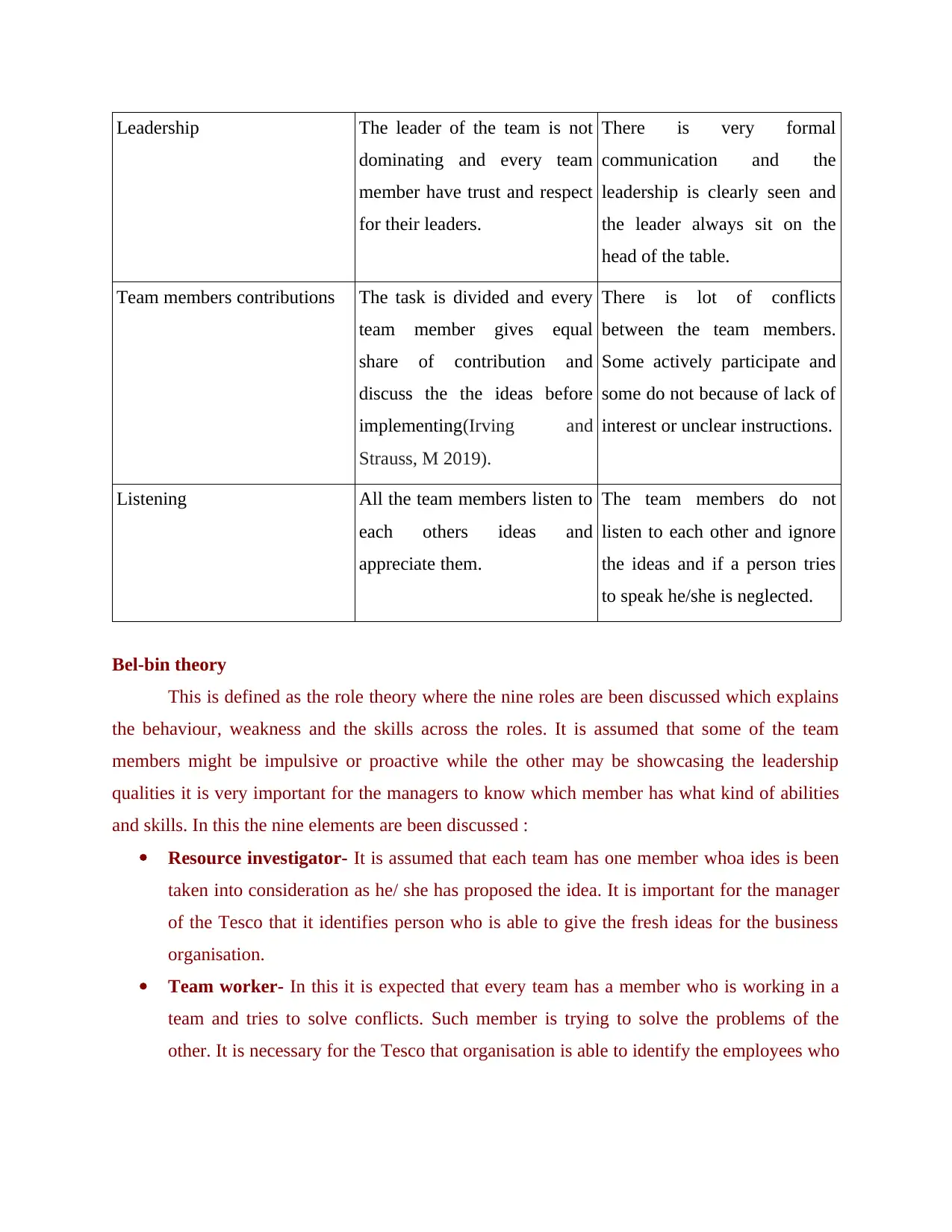
Leadership The leader of the team is not
dominating and every team
member have trust and respect
for their leaders.
There is very formal
communication and the
leadership is clearly seen and
the leader always sit on the
head of the table.
Team members contributions The task is divided and every
team member gives equal
share of contribution and
discuss the the ideas before
implementing(Irving and
Strauss, M 2019).
There is lot of conflicts
between the team members.
Some actively participate and
some do not because of lack of
interest or unclear instructions.
Listening All the team members listen to
each others ideas and
appreciate them.
The team members do not
listen to each other and ignore
the ideas and if a person tries
to speak he/she is neglected.
Bel-bin theory
This is defined as the role theory where the nine roles are been discussed which explains
the behaviour, weakness and the skills across the roles. It is assumed that some of the team
members might be impulsive or proactive while the other may be showcasing the leadership
qualities it is very important for the managers to know which member has what kind of abilities
and skills. In this the nine elements are been discussed :
Resource investigator- It is assumed that each team has one member whoa ides is been
taken into consideration as he/ she has proposed the idea. It is important for the manager
of the Tesco that it identifies person who is able to give the fresh ideas for the business
organisation.
Team worker- In this it is expected that every team has a member who is working in a
team and tries to solve conflicts. Such member is trying to solve the problems of the
other. It is necessary for the Tesco that organisation is able to identify the employees who
dominating and every team
member have trust and respect
for their leaders.
There is very formal
communication and the
leadership is clearly seen and
the leader always sit on the
head of the table.
Team members contributions The task is divided and every
team member gives equal
share of contribution and
discuss the the ideas before
implementing(Irving and
Strauss, M 2019).
There is lot of conflicts
between the team members.
Some actively participate and
some do not because of lack of
interest or unclear instructions.
Listening All the team members listen to
each others ideas and
appreciate them.
The team members do not
listen to each other and ignore
the ideas and if a person tries
to speak he/she is neglected.
Bel-bin theory
This is defined as the role theory where the nine roles are been discussed which explains
the behaviour, weakness and the skills across the roles. It is assumed that some of the team
members might be impulsive or proactive while the other may be showcasing the leadership
qualities it is very important for the managers to know which member has what kind of abilities
and skills. In this the nine elements are been discussed :
Resource investigator- It is assumed that each team has one member whoa ides is been
taken into consideration as he/ she has proposed the idea. It is important for the manager
of the Tesco that it identifies person who is able to give the fresh ideas for the business
organisation.
Team worker- In this it is expected that every team has a member who is working in a
team and tries to solve conflicts. Such member is trying to solve the problems of the
other. It is necessary for the Tesco that organisation is able to identify the employees who
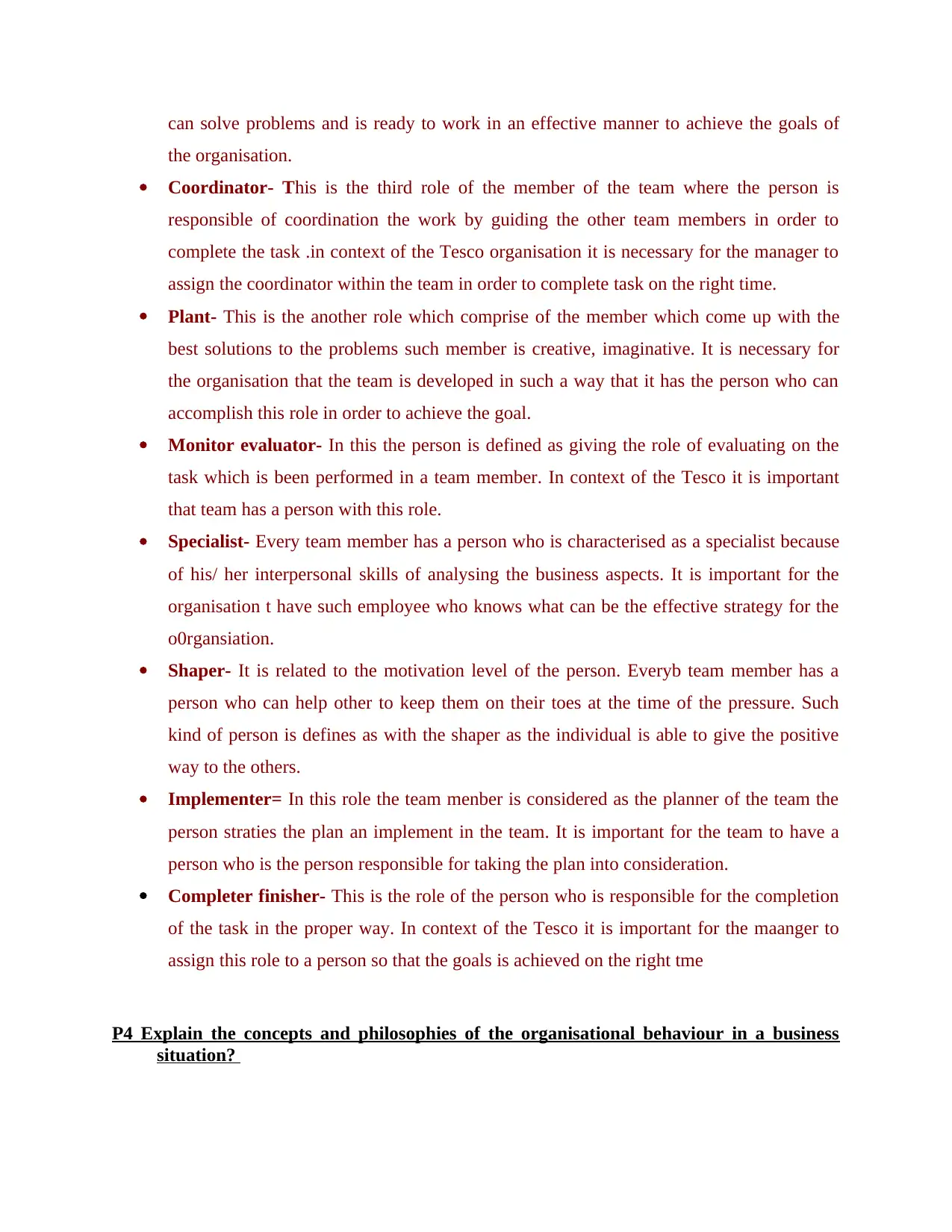
can solve problems and is ready to work in an effective manner to achieve the goals of
the organisation.
Coordinator- This is the third role of the member of the team where the person is
responsible of coordination the work by guiding the other team members in order to
complete the task .in context of the Tesco organisation it is necessary for the manager to
assign the coordinator within the team in order to complete task on the right time.
Plant- This is the another role which comprise of the member which come up with the
best solutions to the problems such member is creative, imaginative. It is necessary for
the organisation that the team is developed in such a way that it has the person who can
accomplish this role in order to achieve the goal.
Monitor evaluator- In this the person is defined as giving the role of evaluating on the
task which is been performed in a team member. In context of the Tesco it is important
that team has a person with this role.
Specialist- Every team member has a person who is characterised as a specialist because
of his/ her interpersonal skills of analysing the business aspects. It is important for the
organisation t have such employee who knows what can be the effective strategy for the
o0rgansiation.
Shaper- It is related to the motivation level of the person. Everyb team member has a
person who can help other to keep them on their toes at the time of the pressure. Such
kind of person is defines as with the shaper as the individual is able to give the positive
way to the others.
Implementer= In this role the team menber is considered as the planner of the team the
person straties the plan an implement in the team. It is important for the team to have a
person who is the person responsible for taking the plan into consideration.
Completer finisher- This is the role of the person who is responsible for the completion
of the task in the proper way. In context of the Tesco it is important for the maanger to
assign this role to a person so that the goals is achieved on the right tme
P4 Explain the concepts and philosophies of the organisational behaviour in a business
situation?
the organisation.
Coordinator- This is the third role of the member of the team where the person is
responsible of coordination the work by guiding the other team members in order to
complete the task .in context of the Tesco organisation it is necessary for the manager to
assign the coordinator within the team in order to complete task on the right time.
Plant- This is the another role which comprise of the member which come up with the
best solutions to the problems such member is creative, imaginative. It is necessary for
the organisation that the team is developed in such a way that it has the person who can
accomplish this role in order to achieve the goal.
Monitor evaluator- In this the person is defined as giving the role of evaluating on the
task which is been performed in a team member. In context of the Tesco it is important
that team has a person with this role.
Specialist- Every team member has a person who is characterised as a specialist because
of his/ her interpersonal skills of analysing the business aspects. It is important for the
organisation t have such employee who knows what can be the effective strategy for the
o0rgansiation.
Shaper- It is related to the motivation level of the person. Everyb team member has a
person who can help other to keep them on their toes at the time of the pressure. Such
kind of person is defines as with the shaper as the individual is able to give the positive
way to the others.
Implementer= In this role the team menber is considered as the planner of the team the
person straties the plan an implement in the team. It is important for the team to have a
person who is the person responsible for taking the plan into consideration.
Completer finisher- This is the role of the person who is responsible for the completion
of the task in the proper way. In context of the Tesco it is important for the maanger to
assign this role to a person so that the goals is achieved on the right tme
P4 Explain the concepts and philosophies of the organisational behaviour in a business
situation?
⊘ This is a preview!⊘
Do you want full access?
Subscribe today to unlock all pages.

Trusted by 1+ million students worldwide
1 out of 15
Related Documents
Your All-in-One AI-Powered Toolkit for Academic Success.
+13062052269
info@desklib.com
Available 24*7 on WhatsApp / Email
![[object Object]](/_next/static/media/star-bottom.7253800d.svg)
Unlock your academic potential
Copyright © 2020–2026 A2Z Services. All Rights Reserved. Developed and managed by ZUCOL.


